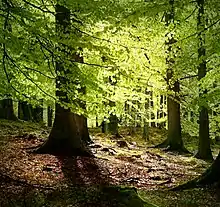лѣсъ
Old Church Slavonic

лѣсъ
Etymology
From Proto-Slavic *lěsъ.
Noun
лѣсъ • (lěsŭ) m
- forest
- woods
- from the Homily against the Bogumils, 1794-1796:
- бо би велѣлъ богъ не дѣлати чловѣкомъ то бꙑлиѥ жито би раждало и лѣсъ грозниѥ.
- bo bi velělŭ bogŭ ne dělati člověkomŭ to bylije žito bi raždalo i lěsŭ groznije.
- If God had ordered men not to work, plants would grow grain and woods grapes.
- from Vita Methodii, 0700210:
- и азъ на лѣсѣ надаю, своі дьнь съконьчавъ.
- i azŭ na lěsě nadaju, svoi dĭnĭ sŭkonĭčavŭ.
- Now my days are ending and I am waiting for the woods.
- from the Homily against the Bogumils, 1794-1796:
Old East Slavic
Etymology
From Proto-Slavic *lě̑sъ.
Pronunciation
Declension
Declension of лѣсъ (hard o-stem)
| Singular | Dual | Plural | |
|---|---|---|---|
| Nominative | лѣсъ lěsŭ |
лѣса lěsa |
лѣси lěsi |
| Genitive | лѣса lěsa |
лѣсу lěsu |
лѣсъ lěsŭ |
| Dative | лѣсу lěsu |
лѣсома lěsoma |
лѣсомъ lěsomŭ |
| Accusative | лѣсъ lěsŭ |
лѣса lěsa |
лѣсꙑ lěsy |
| Instrumental | лѣсъмь lěsŭmĭ |
лѣсома lěsoma |
лѣсꙑ lěsy |
| Locative | лѣсѣ lěsě |
лѣсу lěsu |
лѣсѣхъ lěsěxŭ |
| Vocative | лѣсе lěse |
лѣса lěsa |
лѣси lěsi |
References
- Sreznevsky, Izmail I. (1902), “лѣсъ”, in Матеріалы для Словаря древне-русскаго языка по письменнымъ памятникамъ [Materials for the Dictionary of the Old East Slavic Language Based on Written Monuments] (in Russian), volume 2 (Л – П), Saint Petersburg: Department of Russian Language and Literature of the Imperial Academy of Sciences, column 76
Russian
Noun
лѣсъ • (lěs) m inan (genitive лѣ́са, nominative plural лѣса́, genitive plural лѣсо́въ)
- Pre-1918 spelling of лес (les).
Declension
Pre-reform declension of лѣсъ (inan masc-form hard-stem accent-c irreg)
| singular | plural | |
|---|---|---|
| nominative | лѣ́съ lě́s |
лѣса́△ lěsá△ |
| genitive | лѣ́са lě́sa |
лѣсо́въ lěsóv |
| dative | лѣ́су lě́su |
лѣса́мъ lěsám |
| accusative | лѣ́съ lě́s |
лѣса́△ lěsá△ |
| instrumental | лѣ́сомъ lě́som |
лѣса́ми lěsámi |
| prepositional | лѣ́сѣ lě́sě |
лѣса́хъ lěsáx |
| locative | лѣсу́ lěsú |
△ Irregular.
This article is issued from Wiktionary. The text is licensed under Creative Commons - Attribution - Sharealike. Additional terms may apply for the media files.